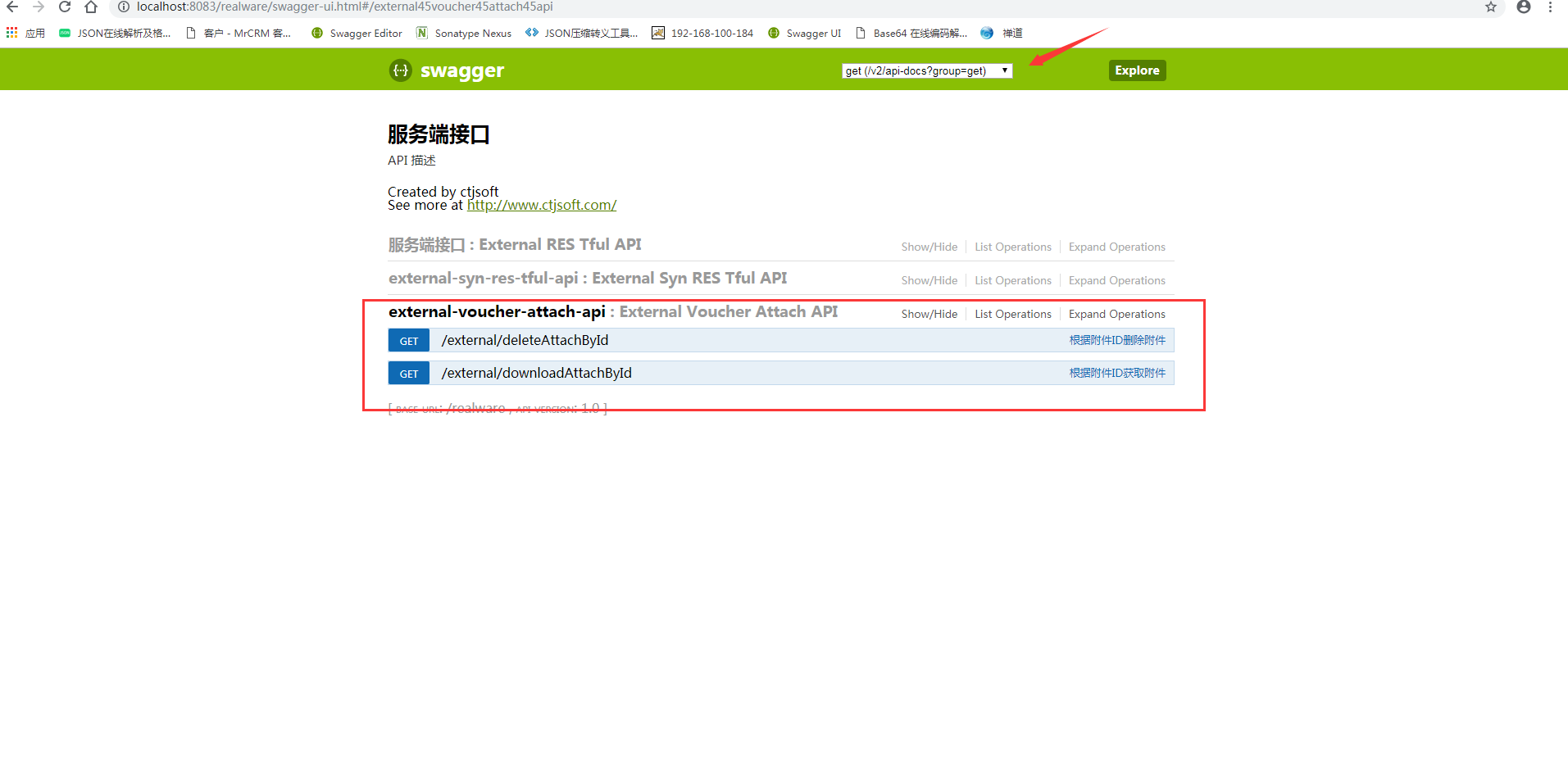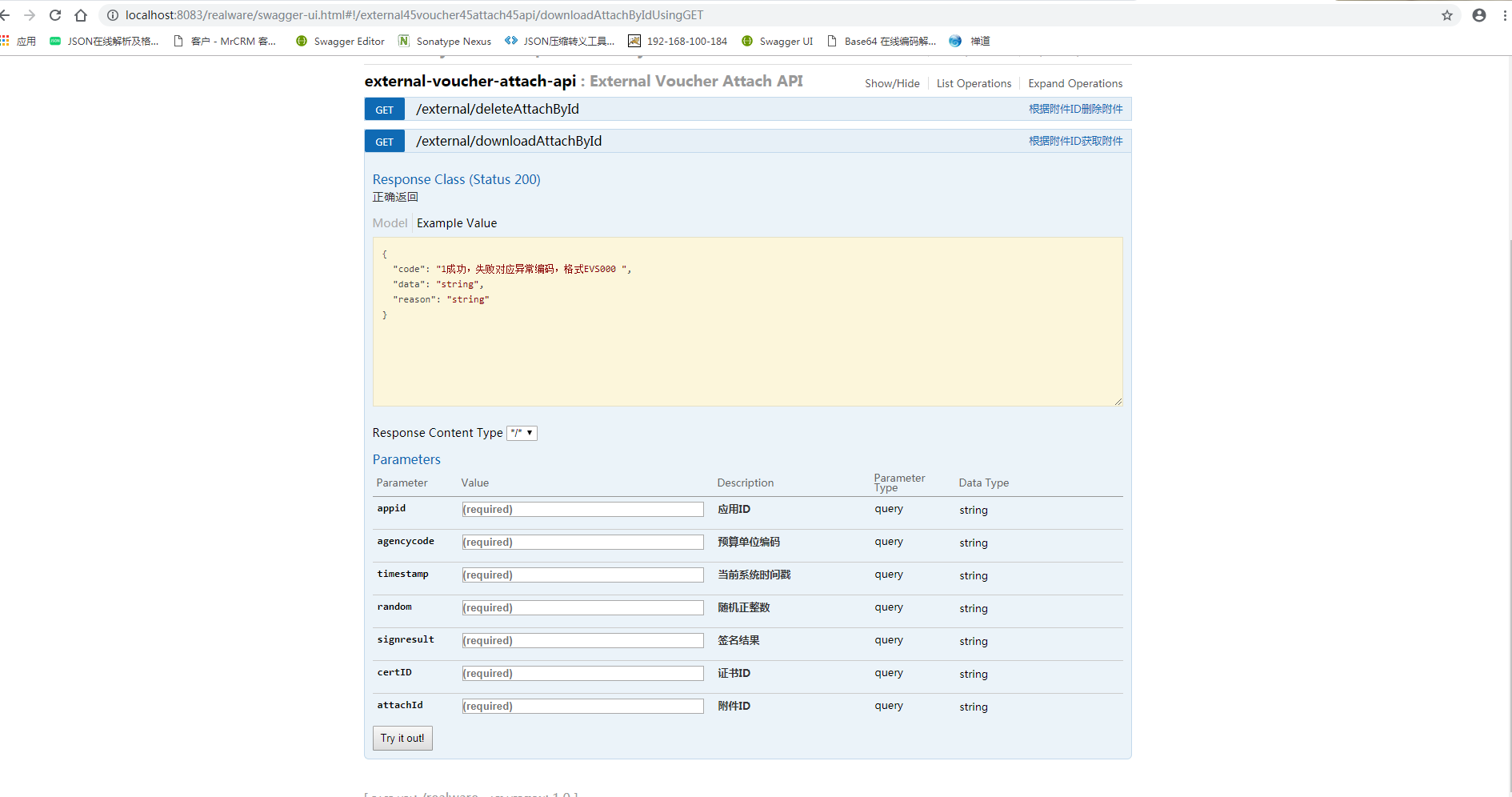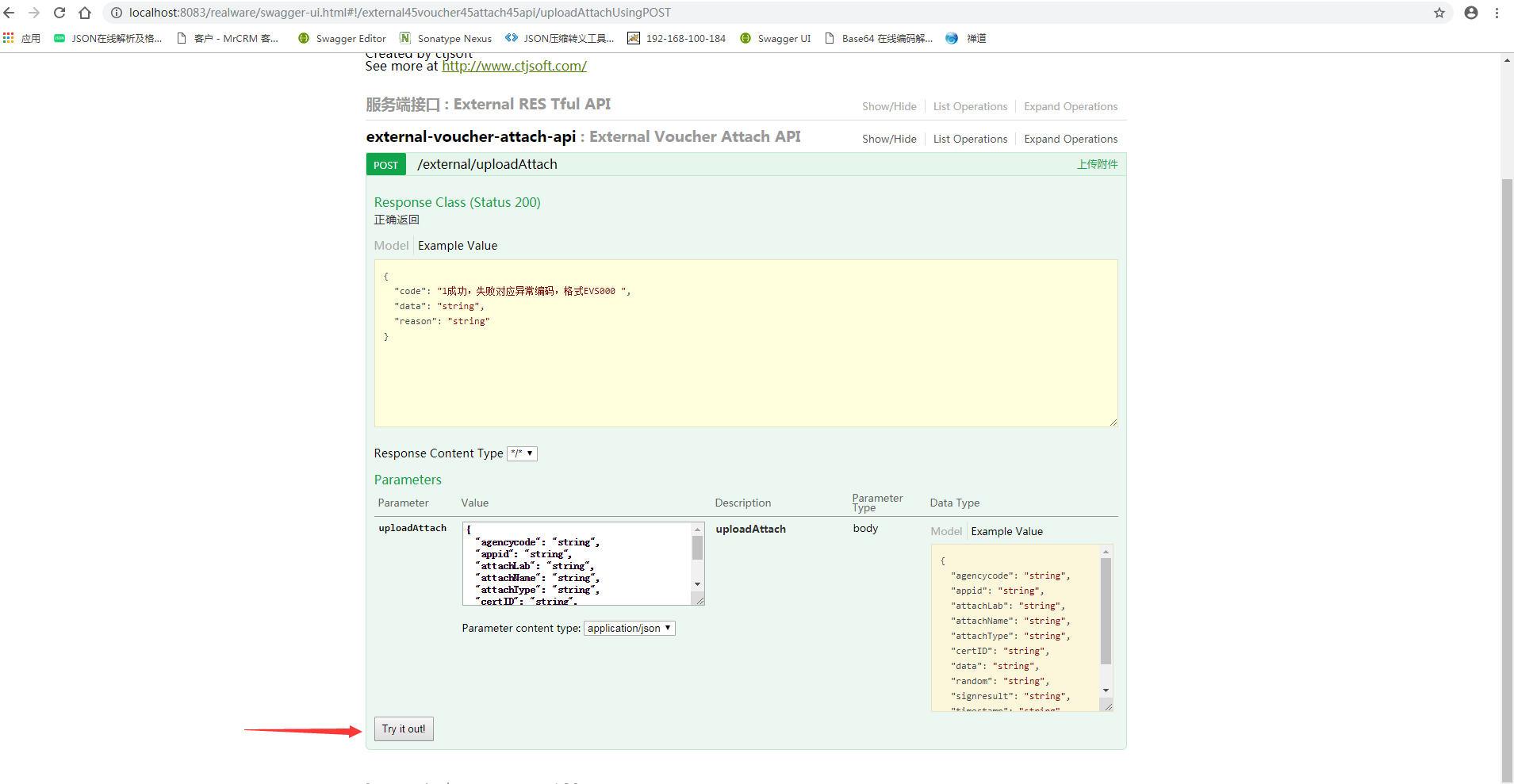SpringBoot与Swagger2整合
一、Swagger简介与优势
相信各位在公司写API文档数量应该不少,当然如果你还处在自己一个人开发前后台的年代,当我没说,如今为了前后台更好的对接,还为了以后交接方便,都有要求写API文档。
Swagger是一款Restful接口的文档在线自动生成+功能测试的软件。
Swagger是一个规范和完整的框架。用于生成、描述、调用和可视化Restful风格的Web服务。总体目标是使客户端和文件系统
作为服务器以同样的速度来更新文件的方法、参数和模型紧密集成到服务器端的代码,允许API来始终保持同步。
手写Api文档的几个痛点:
- 文档需要更新的时候,需要再次发送一份给前端,也就是文档更新交流不及时。
- 接口返回结果不明确
- 不能直接在线测试接口,通常需要使用工具,比如postman
- 接口文档太多,不好管理
Swagger也就是为了解决这个问题,当然也不能说Swagger就一定是完美的,当然也有缺点,最明显的就是代码移入性比较强。
其他的不多说,想要了解Swagger的,可以去Swagger官网,可以直接使用Swagger editor编写接口文档,当然我们这里讲解的是SpringBoot整合Swagger2,直接生成接口文档的方式。
二、SpringBoot Swagger2整合 ,本项目环境springboot版本为 2.1.0,jdk1.8
第一步:jar包的引入:
<dependency>
<groupId>io.springfox</groupId>
<artifactId>springfox-swagger2</artifactId>
<version>2.7.0</version>
</dependency>
<dependency>
<groupId>io.springfox</groupId>
<artifactId>springfox-swagger-ui</artifactId>
<version>2.7.0</version>
</dependency>
第二步:controller层实现swagger接口类 ExternalVoucherAttachAPI
几个注意点,
1.由于本项目涉及到具体的业务类,initialize和setReqAndRes这两个方法可以不用看
2.用到的几个swagger注解
@ApiOperation 用在请求的方法上,说明方法的用户和作用
@ApiResponses 用在请求的方法上,表示一组响应。可以包含多个@ApiResponse()
@ApiResponse() 用于表示一个响应信息
@RequestBody swagger的post请求需要的参数是body类型,get请求用到的是 @ApiImplicitParams(),规范的接口文档都是这样要求的
@ApiImplicitParams 用在请求的方法上,表示一组参数说明,可以包含多个@ApiImplicitParam()
@ApiImplicitParam 指定一个请求参数的各个方面
ApiSuccess.class 这是我们自己的单独写的响应类,会在下面展示
实体类用到的注解:
@ApiModel 用在响应类上,表示一个返回响应数据的信息。
@ApiModelProperty 用在属性上,描述响应类的属性
①下面是ExternalVoucherAttachAPI类的代码:
package assp.evoucher.external.http;
import javax.servlet.http.HttpServletRequest;
import javax.servlet.http.HttpServletResponse;
import assp.evoucher.external.http.call.VoucherAttach;
import assp.evoucher.external.http.model.ApiSuccess;
import assp.evoucher.external.http.model.UploadAttach;
import io.swagger.annotations.*;
import org.slf4j.Logger;
import org.slf4j.LoggerFactory;
import org.springframework.stereotype.Controller;
import org.springframework.web.bind.annotation.ModelAttribute;
import org.springframework.web.bind.annotation.RequestBody;
import org.springframework.web.bind.annotation.RequestMapping;
import org.springframework.web.bind.annotation.RequestMethod;
import springfox.documentation.annotations.ApiIgnore;
import java.io.IOException;
@Controller
public class ExternalVoucherAttachAPI {
private static Logger logger = LoggerFactory.getLogger(ExternalVoucherAttachAPI.class);
//项目具体的业务 可以不看 开始
protected HttpContext httpContext;
@ModelAttribute
public void setReqAndRes(HttpServletRequest request,
HttpServletResponse response) {
httpContext = new HttpContext();
httpContext.setRequest(request);
httpContext.setResponse(response);
httpContext.setSession(request.getSession());
}
/**
* 初始化
* @return
*/
private Object initialize(Class<?> className){
Object queryCglib = null;
try {
HttpCallInterceptor cglib = new HttpCallInterceptor(httpContext);
queryCglib = cglib.getInstance(className);
} catch (Exception e) {
logger.error("对象序列话失败, cause by:" + e.getMessage(), e);
}
return queryCglib;
}
//项目具体的业务 可以不看 结束
@ApiOperation(value = "上传附件")
@ApiResponses({@ApiResponse(code = 200, message = "正确返回" ,response =ApiSuccess.class)})
@RequestMapping(value = "/external/uploadAttach",method = RequestMethod.POST)
public void uploadAttach(@RequestBody UploadAttach uploadAttach) {
VoucherAttach voucherAttach = (VoucherAttach)this.initialize(VoucherAttach.class);
httpContext.setObiect(uploadAttach);
voucherAttach.uploadAttachById(httpContext);
}
@ApiOperation(value = "根据附件ID获取附件")
@ApiImplicitParams({
@ApiImplicitParam(required = true, name = "certID", value = "证书ID", paramType = "query", dataType = "string"),
@ApiImplicitParam(required = true, name = "attachId", value = "附件ID", paramType = "query", dataType = "string")
})
@ApiResponses({@ApiResponse(code = 200, message = "正确返回" ,response = ApiSuccess.class)})
@RequestMapping(value = "/external/downloadAttachById",method = RequestMethod.GET)
public void downloadAttachById(){
VoucherAttach voucherAttach = (VoucherAttach)this.initialize(VoucherAttach.class);
voucherAttach.downloadAttachById(httpContext);
}
@ApiOperation(value = "根据附件ID删除附件")
@ApiImplicitParams({
@ApiImplicitParam(required = true, name = "certID", value = "证书ID", paramType = "query", dataType = "string"),
@ApiImplicitParam(required = true, name = "attachId", value = "附件ID", paramType = "query", dataType = "string")
})
@ApiResponses({@ApiResponse(code = 200, message = "正确返回" ,response = ApiSuccess.class)})
@RequestMapping(value = "/external/deleteAttachById",method = RequestMethod.GET)
public void deleteAttachById(){
VoucherAttach voucherAttach = (VoucherAttach)this.initialize(VoucherAttach.class);
voucherAttach.deleteAttachForID(httpContext);
}
}
②下面是 post请求参数 实体类UploadAttach的代码:
CommonParameter类是公共参数,所有的post请求实体类继承该类
package assp.evoucher.external.http.model; import io.swagger.annotations.ApiModel; import io.swagger.annotations.ApiModelProperty; @ApiModel(value="UploadAttach") public class UploadAttach extends CommonParameter { @ApiModelProperty(value="机构证书ID",required=true) private String certID; @ApiModelProperty(value="附件类型",required=true) private String attachType; @ApiModelProperty(value="附件名称",required=true) private String attachName; @ApiModelProperty(value="附件分类",required=true) private String attachLab; @ApiModelProperty(value="data",required=true) private String data; public String getCertID() { return certID; } public void setCertID(String certID) { this.certID = certID; } public String getData() { return data; } public void setData(String data) { this.data = data; } public void setAttachType(String attachType) { this.attachType = attachType; } public String getAttachType() { return attachType; } public String getAttachName() { return attachName; } public void setAttachName(String attachName) { this.attachName = attachName; } public String getAttachLab() { return attachLab; } public void setAttachLab(String attachLab) { this.attachLab = attachLab; } }
③下面是实体父类CommonParameter 的代码
package assp.evoucher.external.http.model; import io.swagger.annotations.ApiModelProperty; public class CommonParameter { @ApiModelProperty(value="应用ID",required=true) protected String appid; @ApiModelProperty(value="预算单位编码",required=true) protected String agencycode; @ApiModelProperty(value="当前系统时间戳",required=true) protected String timestamp; @ApiModelProperty(value="随机正整数",required=true) protected String random; @ApiModelProperty(value="签名结果",required=true) protected String signresult; public String getAppid() { return appid; } public void setAppid(String appid) { this.appid = appid; } public String getAgencycode() { return agencycode; } public void setAgencycode(String agencycode) { this.agencycode = agencycode; } public String getTimestamp() { return timestamp; } public void setTimestamp(String timestamp) { this.timestamp = timestamp; } public String getRandom() { return random; } public void setRandom(String random) { this.random = random; } public String getSignresult() { return signresult; } public void setSignresult(String signresult) { this.signresult = signresult; } }
④ApiSuccess 这是我们自己的单独写的响应类
package assp.evoucher.external.http.model; import io.swagger.annotations.ApiModel; import io.swagger.annotations.ApiModelProperty; @ApiModel(value="ApiResponse") public class ApiSuccess { @ApiModelProperty(value="返回码 ",example="1成功,失败对应异常编码,格式EVS000 ") private int code; @ApiModelProperty(value="异常原因 ") private String reason; @ApiModelProperty(value="接口调用成功后的数据结果") private String data; public int getCode() { return code; } public void setCode(int code) { this.code = code; } public String getReason() { return reason; } public void setReason(String reason) { this.reason = reason; } public String getData() { return data; } public void setData(String data) { this.data = data; } }
第三步:swagger的配置启动类编写:
关于几个注意点:
1.访问404的原因,首先Spring Boot自动配置本身不会自动把/swagger-ui.html这个路径映射到对应的目录META-INF/resources/下面。
所以我们需要动态的进行mvc资源文件的指定,所以会用到 addResourceHandlers 方法
2.本项目get请求和post请求分开,由于会用到一些公共参数
get请求采用了如下配置
也就是上面的该方法 customDocket_get() ,这样我们提供的接口方法 需要的参数不用在每个实体类上继成公共类
post请求采用了如下配置
也就是该方法 customDocket_post(),post请求采用的 接口需要的参数在每个实体类上继成公共类
3.在请求的方法上,表示一组响应
responseMessageList.add(new ResponseMessageBuilder().code(200)
.message("正确返回").responseModel(new ModelRef("ApiSuccess"))
.build());
4.需要swagger展示的接口需要指定包路径.apis(SwaggerApiSelectors.basePackageAndRequestMethod("assp.evoucher.external.http", RequestMethod.GET))
下面是SwaggerConfig的代码:
package assp.evoucher.sysmgr; import org.springframework.beans.factory.annotation.Value; import org.springframework.context.annotation.Bean; import org.springframework.context.annotation.Configuration; import org.springframework.context.annotation.PropertySource; import org.springframework.web.bind.annotation.RequestMethod; import org.springframework.web.servlet.config.annotation.EnableWebMvc; import org.springframework.web.servlet.config.annotation.ResourceHandlerRegistry; import org.springframework.web.servlet.config.annotation.WebMvcConfigurationSupport; import org.springframework.web.servlet.config.annotation.WebMvcConfigurer; import springfox.documentation.builders.*; import springfox.documentation.schema.ModelRef; import springfox.documentation.service.ApiInfo; import springfox.documentation.service.Contact; import springfox.documentation.service.Parameter; import springfox.documentation.service.ResponseMessage; import springfox.documentation.spi.DocumentationType; import springfox.documentation.spring.web.plugins.Docket; import springfox.documentation.swagger2.annotations.EnableSwagger2; import java.util.ArrayList; import java.util.List; @Configuration @EnableSwagger2 public class SwaggerConfig implements WebMvcConfigurer { //get请求配置 @Bean public Docket customDocket_get() {
//指定一组响应,本项目只指定响应200的描述 List<ResponseMessage> responseMessageList = new ArrayList<ResponseMessage>(); responseMessageList.add(new ResponseMessageBuilder().code(200) .message("正确返回").responseModel(new ModelRef("ApiSuccess")) .build());
//所有的get请求加上公共参数 ParameterBuilder parameterBuilder = new ParameterBuilder(); List<Parameter> params = new ArrayList<>(); parameterBuilder.name("appid").description("应用ID").modelRef(new ModelRef("string")) .parameterType("query").required(true); params.add(parameterBuilder.build()); parameterBuilder.name("agencycode").description("预算单位编码").modelRef(new ModelRef("string")) .parameterType("query").required(true); params.add(parameterBuilder.build()); parameterBuilder.name("timestamp").description("当前系统时间戳").modelRef(new ModelRef("string")) .parameterType("query").required(true); params.add(parameterBuilder.build()); parameterBuilder.name("random").description("随机正整数").modelRef(new ModelRef("string")) .parameterType("query").required(true); params.add(parameterBuilder.build()); parameterBuilder.name("signresult").description("签名结果").modelRef(new ModelRef("string")) .parameterType("query").required(true); params.add(parameterBuilder.build()); /* * responseMessageList.add(new ResponseMessageBuilder().code(404) * .message("找不到资源").responseModel(new ModelRef("ApiError")) .build()); * responseMessageList.add(new ResponseMessageBuilder().code(500) * .message("服务器内部错误").responseModel(new ModelRef("ApiError")) * .build()); responseMessageList.add(new * ResponseMessageBuilder().code(409) * .message("业务逻辑异常").responseModel(new ModelRef("ApiError")) .build()); * responseMessageList.add(new ResponseMessageBuilder().code(422) * .message("参数校验异常").responseModel(new ModelRef("ApiError")) .build()); * responseMessageList.add(new ResponseMessageBuilder().code(503) * .message("Hystrix异常").responseModel(new ModelRef("ApiError")) * .build()); */ return new Docket(DocumentationType.SWAGGER_2).groupName("get") .globalResponseMessage(RequestMethod.GET, responseMessageList) .globalResponseMessage(RequestMethod.POST, responseMessageList) .globalResponseMessage(RequestMethod.PUT, responseMessageList) .globalResponseMessage(RequestMethod.DELETE, responseMessageList).apiInfo(apiInfo()).select() .apis(SwaggerApiSelectors.basePackageAndRequestMethod("assp.evoucher.external.http", RequestMethod.GET)) .paths(PathSelectors.any()) .build().globalOperationParameters(params); //.pathMapping("/external"); //.host(host); // 在这里可以设置请求的统一前缀 } //post请求配置 @Bean public Docket customDocket_post() { List<ResponseMessage> responseMessageList = new ArrayList<ResponseMessage>(); responseMessageList.add(new ResponseMessageBuilder().code(200) .message("正确返回").responseModel(new ModelRef("ApiSuccess")) .build()); /* * responseMessageList.add(new ResponseMessageBuilder().code(404) * .message("找不到资源").responseModel(new ModelRef("ApiError")) .build()); * responseMessageList.add(new ResponseMessageBuilder().code(500) * .message("服务器内部错误").responseModel(new ModelRef("ApiError")) * .build()); responseMessageList.add(new * ResponseMessageBuilder().code(409) * .message("业务逻辑异常").responseModel(new ModelRef("ApiError")) .build()); * responseMessageList.add(new ResponseMessageBuilder().code(422) * .message("参数校验异常").responseModel(new ModelRef("ApiError")) .build()); * responseMessageList.add(new ResponseMessageBuilder().code(503) * .message("Hystrix异常").responseModel(new ModelRef("ApiError")) * .build()); */ return new Docket(DocumentationType.SWAGGER_2).groupName("post") .globalResponseMessage(RequestMethod.GET, responseMessageList) .globalResponseMessage(RequestMethod.POST, responseMessageList) .globalResponseMessage(RequestMethod.PUT, responseMessageList) .globalResponseMessage(RequestMethod.DELETE, responseMessageList).apiInfo(apiInfo()).select() .apis(SwaggerApiSelectors.basePackageAndRequestMethod("assp.evoucher.external.http", RequestMethod.POST))//指定需要用swagger展示的包路径 .paths(PathSelectors.any()) .build(); //.pathMapping("/external"); //.host(host); // 在这里可以设置请求的统一前缀 } //swagger文档描述 private ApiInfo apiInfo() { return new ApiInfoBuilder() //页面标题 .title("服务端接口") //创建人 .contact(new Contact("ctjsoft", "http://www.ctjsoft.com/", "")) //版本号 .version("1.0") //描述 .description("API 描述") .build(); } //动态的进行mvc资源文件的指定,所以会用到 addResourceHandlers 方法,否则可能会出现404问题 @Override public void addResourceHandlers(ResourceHandlerRegistry registry) { /* registry.addResourceHandler("/**").addResourceLocations( "classpath:/static/");*/ registry.addResourceHandler("swagger-ui.html").addResourceLocations( "classpath:/META-INF/resources/"); registry.addResourceHandler("/webjars/**").addResourceLocations( "classpath:/META-INF/resources/webjars/"); } }
第四步:如果需要展示swagger接口的controller类跟项目启动类不在同一个包下,需要在启动类中用ComponentScan指定扫描路径
package assp.evoucher.sysmgr; import org.apache.axis.transport.http.AxisServlet; import org.springframework.boot.SpringApplication; import org.springframework.boot.autoconfigure.SpringBootApplication; import org.springframework.boot.autoconfigure.jdbc.DataSourceAutoConfiguration; import org.springframework.boot.builder.SpringApplicationBuilder; import org.springframework.boot.web.servlet.ServletRegistrationBean; import org.springframework.boot.web.servlet.support.SpringBootServletInitializer; import org.springframework.context.annotation.Bean; import org.springframework.context.annotation.ComponentScan; @SpringBootApplication @ComponentScan(basePackages = {"assp.*"})//指定swagger接口所在路径 public class EvoucherApplication { public static void main(String[] args) { SpringApplication.run(EvoucherApplication.class, args); } } }
第五步:访问swagger路径 http://localhost:8083/realware/swagger-ui.html,SpringBoot Swagger2整合完毕
get请求与post请求分离(本项目get请求与post请求分开单独做一些业务处理,也可以不分开):
get请求:

具体参数:

post请求:
具体参数:
点击 Try it out! 开始测试接口




